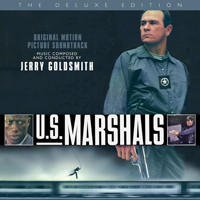- Composed by Jerry Goldsmith
- Varèse Sarabande / 74m
A world-class film editor he may have been, but Stuart Baird’s directorial career is unlikely to be considered alongside the all-time greats. Apologies if that seems a somewhat controversial statement – clearly he is set well apart from the workmanlike Truffaut or the emperor’s new clothes wrapped so frequently around Luis Buñuel, who never made anything which made the box office of U.S. Marshals – I merely mean that it would be a stretch to consider him in the top two or three directors of all time.
100% of his films were scored by Jerry Goldsmith, and there aren’t many directors you can say that about. This one was an unlikely seminal moment in the composer’s later career – scored throughout with a dynamic fanfare-like action theme, it served as the template for much of the action music he would write thereafter. What’s different about U.S. Marshals is that he uses it as the score’s main theme rather than as a secondary action device.

It’s heard right at the start of the score in “The Set Down” before being expanded upon a little in “Nuggets and Bullets”. The first really big action set piece comes in “Sinking Plane”, where all those familiar Goldsmith techniques that made him the best of the best at action scoring can be heard – the propulsive rhythm, the signature left-hand piano, the snares and brass – and the melody.
There aren’t many secondary themes here – one is introduced in “The Pen”, and it’s a good one! It sounds even better on solo trumpet later in the very brief “The Humidor”. More explosive action comes in “Heading for the Swamp” where the main action theme alternates with another little motif; but the best follows immediately after in the lengthy “Swamp Search” which is a glorious exhibition of the composer’s technique on this sort of film.
There’s another big action blowout to come – the six-minute “Following Chen”, which ratchets up the tension and then releases it. Endless variations on that action theme mix with little suspense motifs, real and synth percussion, the piano of course – it’s really good. “Funeral Ambush” is briefer but just as explosive; and it’s followed by the similar “The Front Gate” which is very similar at times to Star Trek: Insurrection‘s “The Drones Attack” which came a little later the same year. And then end of the score brings the brilliant “Free to Go” where Goldsmith somehow turns that action theme into a gorgeous, romantic piece – I have always loved this one specifically, but it’s something he did all the time in this type of movie and nobody seems to do any more, much to my chagrin.
The score is one of a quartet of action thrillers by Goldsmith between 1996 and 1998 and the last of that bunch to have had an extended release on the Varèse Sarabande CD Club. I thought the other three all benefited quite a lot from the expansions from their original half-hour albums; I’m not quite as sure about this one. The best material was certainly on the original album (most of the tracks I’ve highlighted above were on the 1998 release; most of the many I haven’t highlighted are either very short or very similar to what was already there) and even while at its best the score is very exciting, it never hits the heights of Chain Reaction‘s “Open Door” or Air Force One‘s “The Hijacking”. However, as usual with Goldsmith, it is nice to have the whole thing. Even while it is never going to be a favourite as an album listen, it really does elevate its film in a way I’m not sure was given the credit it deserved at the time (seriously, just track this score into something like Skyscraper and you’d immediately make that film something so much better).
Rating: ***
facebook.com/moviewave | twitter.com/MovieWaveDotNet | amazon.com












Good score, bad review.